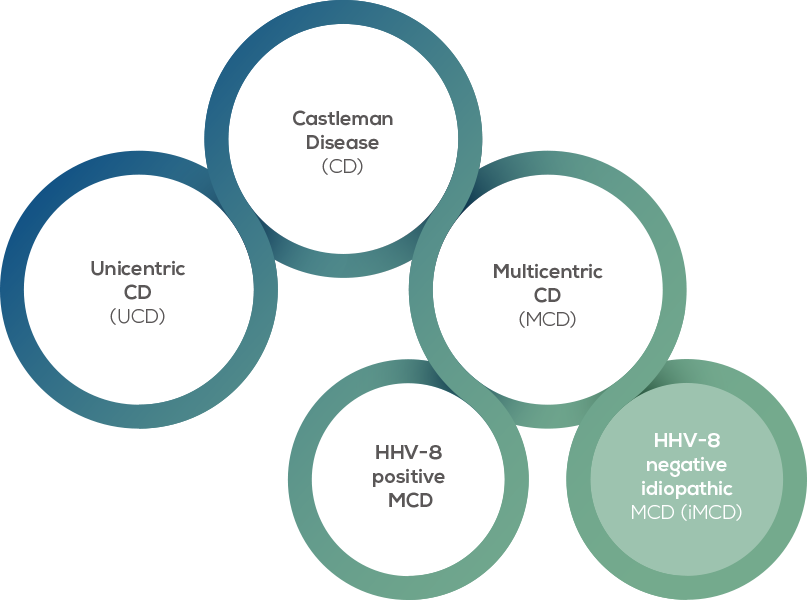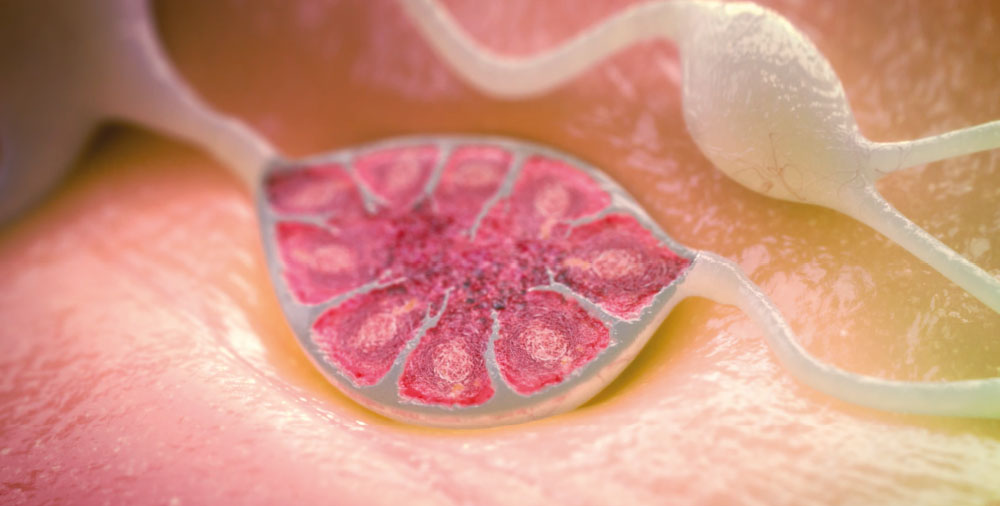Understanding iMCD
What is CASTLEMAN DISEASE?
Castleman disease is a rare disease that affects the lymphatic system. The lymphatic system which is a network of organs, vessels and lymph nodes responsible for removing toxins, waste and other unwanted materials from the body. The most common form of this disease is called unicentric Castleman disease, which affects a single lymph node or region of lymph nodes.
What is
MULTICENTRIC CASTLEMAN DISEASE?
Multicentric Castleman Disease (MCD) is a form of Castleman disease that has spread to multiple regions of lymph nodes rather than being isolated to a single location or node which makes it more aggressive in nature.
There are two main types of MCD. One type is known as HHV-8-associated or HIV-associated MCD, which is triggered by a human herpesvirus (the same family that causes cold sores) or human immunodeficiency virus, respectively. The other type is known as idiopathic MCD (iMCD).
The main types of Castleman disease

What is iMCD?
Being ‘idiopathic’ means that the cause of your MCD is not known. Only between 3 and 4 people among every million in the general population are diagnosed with iMCD each year.1 It can affect anyone – males, females, adults and children, although most people with iMCD are above the age of 45.1
iMCD behaves in a
SIMILAR WAY TO SOME CANCERS

It is actually a lymphoproliferative disorder, which means that there is an abnormal overgrowth of cells in your lymph system. Although not officially a cancer, iMCD is a very serious condition that behaves very much like cancers of the lymph nodes known as lymphomas and is often mistaken as such. However, the treatment options for iMCD are different to that of cancer. If left untreated, iMCD may actually evolve into malignancy.
Symptoms and WHAT TO EXPECT
Before you were diagnosed, you may have experienced a variety of symptoms that could have been mistaken for a variety of other diseases. iMCD varies from person to person and can range from mild to severe, with symptoms including:

Keeping a symptom diary is an easy way to make a note of any changes that you may experience in your condition. It is important to keep track of changes in your symptoms, or any new ones that may appear.
Report any changes that you have noticed to your doctor as soon as possible, even if they don’t seem important to you.
The DAY-TO-DAY IMPACT

It is important to diagnose iMCD as soon as possible in order to get the most out of potential treatments. As soon as you have been diagnosed with iMCD, your doctor is able to assess your condition and determine the most suitable management plan for you.
However, a diagnosis of iMCD can have a significant impact on you, your family, and your social life. Common feelings during this life-changing experience may include anxiety, distress, and depression. The physical and emotional impact of the disease may be felt at home, school or work and its treatment may in some cases present a cost burden to families and patients.
There are several featured resources available on this site that may be able to offer some guidance on how to approach and cope with some of the challenges that iMCD can bring.
The LONG TERM IMPACT

It is important to understand that iMCD is a progressive disease which may lead to more severe symptoms if left untreated. You will also be at risk of developing other conditions which may have a significant impact on the prognosis.
Discuss your diagnosis with your doctor to understand what your individual circumstance may bring.
How is iMCD TREATED?
Treatment of iMCD is challenging, and treatment options and outcomes depend on the severity in each person. There is no standard therapy for iMCD, and no single treatment works for all patients. Generally, doctors will aim to use treatments that reach all parts of the body such as:2
Immunotherapy is the first line of treatment for iMCD
- targets the immune system
- administered by injection
- may be given with corticosteroids, in severe cases
- Sylvant® is the recommended immunotherapy for the first line of treatment for iMCD in the international guidelines2
Corticosteroids are sometimes prescribed on their own or with other treatments
- reduce the activity of the immune system
- high doses given initially in severe cases
Chemotherapy may be given in severe cases if patients progress or don’t respond to initial therapy
- shrinks fast growing cells in your body
- administered intravenously
Antiviral therapy is given in cases of viral infection
- for the management of infections sometimes associated with iMCD
- for HHV-8- and HIV-associated MCD
- administered orally
Surgery and RADIOTHERAPY
iMCD is often too widespread for targeted treatments such as surgery and radiation to be effective in isolation, however, these methods may be used on a case-by-case basis for symptomatic relief.
It is important for you to understand that treatment outcomes depend heavily on individual circumstances. In some patients their iMCD improves or even subsides completely (at least for a time) while others may not be helped by drugs at all, however, there are still further options for these patients.
Discuss your individual circumstance with your doctor. They will be able to explain and provide detailed information around your treatment plan.
iMCD and MENTAL WELLBEING
iMCD is not a neurological condition. However, for some patients, living with the symptoms of iMCD may have a toll on mental wellbeing.
The following information applies to general mental wellbeing and is not specific to iMCD.
Proactivity around the maintenance of your mental wellbeing during your iMCD journey will prove to be vital as you progress through treatment. Even if you don’t feel like your mental wellbeing is at risk, maintaining healthy practices to ensure its upkeep is strongly advised.
You should develop a mental wellbeing maintenance strategy with your doctor, which may involve some of the following:
- Regular mindfulness practice (such as guided meditation or apps like ‘Headspace’)
- Cognitive behavioural therapy (face-to-face with a therapist or online)
- Getting quality sleep
- Managing your stress and stress inducing activities (e.g., work or school stress)
- Staying active with exercise (discuss with a doctor before commencing new exercise)
- Maintaining social connections (spending time with friends and family)
- Joining a patient support group or relevant social media group can help you connect with others living with iMCD (see our Support & Resources section to learn more)
If you have developed feelings that overwhelm or concern you, or that go on for more than 2 weeks, you should talk to your doctor.
References
- Mukherjee S et al. Epidemiology and treatment patterns of HHV-8-negative/idiopathic multicentric Castleman disease in the era of Interleukin-6 directed therapy. Blood Adv. 2022;6(2):359–367.
- van Rhee F et al. International, evidence-based consensus treatment guidelines for idiopathic multicentric Castleman disease. Blood 2018;132(20):2115–2124.
